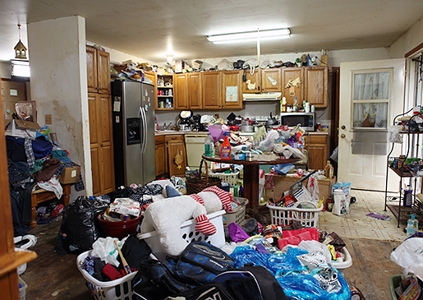In an article from TIME Magazine author Maia Szalavitz addresses a unique problem with decision making in the brain of a Hoarder. Why do some people find it impossible to get rid of old newspapers and junk mail, and end up hoarding them instead? New research suggests that hoarders have unique patterns of brain activity when faced with making decisions about their possessions, compared with healthy people. And despite the fact that hoarding has traditionally been seen as a symptom or subtype of obsessive-compulsive disorder (OCD), brain activity in those who cannot de-clutter is also distinct from that of people with typical OCD, the study shows.
For the new research, published in the Archives of General Psychiatry, David Tolin of the Institute of Living in Hartford, Conn., recruited 107 people for brain scans using functional magnetic resonance imaging (fMRI). Forty-three people had hoarding disorder, 31 people had OCD and 33 participants were normal controls.
The participants were asked to bring a sample of their own junk mail or newspapers to the lab and were assured that researchers wouldn’t throw out anything they wanted to keep. The participants were also told that while they were having their brain activity imaged, they would be asked to decide whether to keep or shred these papers. Inside the scanner, the participants were shown images of either their own stuff — preceded by a slide identifying it as “Yours” — or images of junk mail and newspapers from the lab, labeled “Ours.” For each item, they had to decide whether or not to submit it to the shredder.
Not surprisingly, people with hoarding disorder chose to keep more of their own items than did those with OCD or those without a diagnosis. When they were faced with tossing or keeping their own items, the hoarders’ brain responses also differed from that of the other participants: they showed excessive activation in the anterior cingulate cortex, a brain region involved with decision-making, particularly in situations involving conflicting information or uncertainty.
Activity was also elevated in the insula, a region that monitors one’s emotional and physical state (it’s also involved in disgust, shame, and other strong negative emotions). Together, these regions help assign relative levels of importance or significance to objects.
“Hoarders have great difficulty making decisions, especially around the value of their possessions,” says Michael Jenike, an OCD expert and professor of psychiatry at Harvard, who was not associated with the research. “This study is very interesting as it demonstrates that brain regions associated with monitoring for errors under conditions of uncertainty are activated when hoarding patients are deciding whether or not to throw out personal items.”
In other words, hoarders assign too much value to their possessions, making it difficult or impossible to decide to get rid of them.
So, it’s not that hoarders are slobs or obsessive collectors. Rather, it’s that they have problems making the kinds of decisions about their stuff that others would consider reasonable.
Source: http://healthland.time.com/2012/08/07/inside-the-hoarders-brain-a-unique-problem-with-decision-making/


